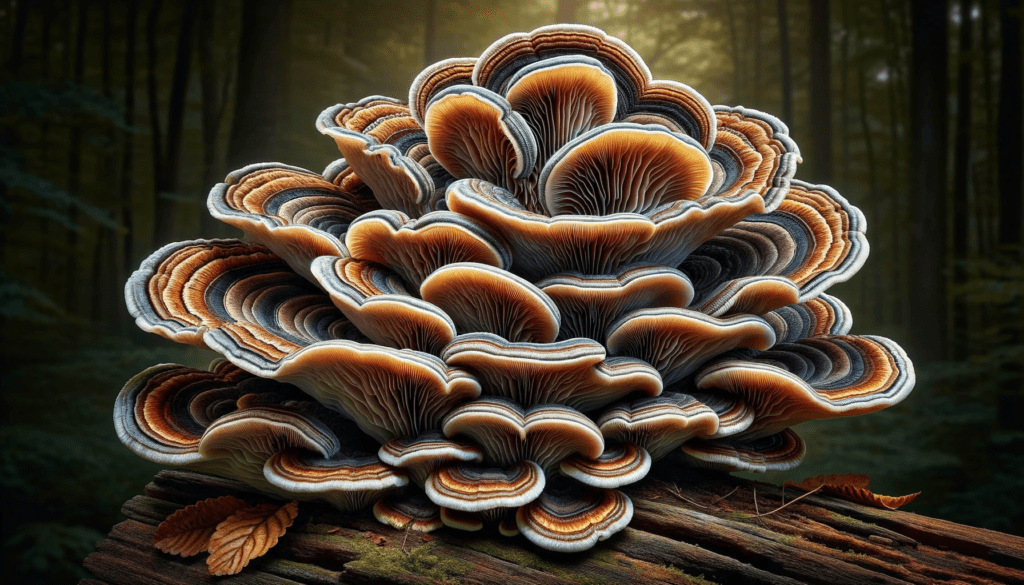Forget where you left your keys again? Having trouble remembering names at networking events perhaps? You may have heard the buzz around nootropic “smart mushrooms” boosting brain performance like memory. Keep reading as we unpack fungi species indicating cognitive benefits and explore their functional potential in supporting our aging minds.
Mushrooms Evolving from Food to Smart Supplements
Prized for their rich umami flavor and established nutritional value, edible mushrooms offer much more – housing compounds that interact profoundly with human physiology and cognition.
Once dismissed as weird fungi of fringe interest, global wellness markets now covet mushrooms, with “medicinal varieties” surpassing $18 billion in sales. What shifted perspectives?
Rigorous scientific validation of therapeutic compounds, consumer education, and accentuated interest in natural brain health alternatives allow sharper mental acuity as we age.
Early research indicates certain mushroom extracts enhance neurological communication, blood flow, and neuron regeneration by:
● Boosting nerve growth factors essential for learning and memory circuits
● Proliferating neuron-protecting antioxidants within brain tissue
● Improving cerebral oxygenation and metabolic support
● Balancing excitatory and inhibitory neurotransmitters
● Exhibiting anti-inflammatory and immunomodulatory effects in the brain
While clinical insights remain formative, data converging from cell, animal, and human studies shines promising light on mushrooms for combating cognitive decline, brain fog, and memory lapses.
Top Mushrooms that May Enhance Memory
Several science-backed medicinal mushrooms stand out for memory, focus, and processing upgrades:
Lion’s Mane

This aptly named mushroom resembles a furry lion’s mane. Used for centuries in traditional Chinese medicine, lion’s mane exhibits exceptional neuroregenerative abilities partially explained by bioactives like hericenones and erinacines which spur synthesis of neurotrophic growth factor (NGF) – essential for neuron health and communication circuits that facilitate memory encoding and retrieval.
Enhanced NGF levels help repair myelin nerve sheath damage that impedes conduction speed – manifesting as cognitive cloudiness and memory lapses as we age. Early evidence confirms lion’s mane capsules improve recall speed and accuracy while reducing memory-linked anxiety and brain fog.
Reishi

Nicknamed the “mushroom of immortality” in ancient Eastern medicine traditions, reishi offers extensive therapeutic effects, including neutralizing neurological plaque formation seen in Alzheimer’s disease. This iconic red medicinal mushroom also accelerates cerebrovascular circulation for heightened focus, mood, and memory.
Rich triterpenoids called ganoderic acids shield neurons from free radical destruction while preserving neuroplasticity – our brains’ ability to continually make new connections vital for laying down memory. Reishi further supports memory consolidation during sleep for committing short-term memory into permanent storage.
Cordyceps

Rare Cordyceps mushrooms burst onto the natural performance scene when Chinese Olympic athletes broke world records in the 1990s after adopting this traditional Tibetan remedy. Later studies revealed key bioactives like cordycepin generate ATP molecules fueling brain cell mitochondria while regulating neurotransmitters – upregulating cognition, mood, and perceived energy levels.
These cascading benefits translate to faster cognitive processing, improved memory retrieval, and better executive function regulation. Research confirms aged populations scoring lower on memory assessments gain significant cognitive assistance from daily Cordyceps supplementation over 8-12 weeks.
Chaga

Known as the “king of mushrooms” in Russian folk medicine, Chaga grows wild on birch trees as a hard, cracked fungal mass resembling charred wood, leading to its nickname “coal mushroom.” Despite its inauspicious appearance, chaga delivers profoundly nourishing medicine internally and for the brain demonstrated in emerging research.
Dense triterpenoids and diverse antioxidant phenols reduce neuronal inflammation and free radical damage connected to poor memory and impaired focus as we age. Chaga’s compounds also appear to stimulate neuron genesis – the growth of new brain cells to continually strengthen networks facilitating more accurate memory capture, storage, and recall.
Turkey Tail

This unassuming mushroom, named for its vibrant stripes reminiscent of wild turkey feathers, holds amazing immune and potentially brain-boosting abilities. Used extensively in Asia and by Native American tribes as medicine, turkey tail harbors specialized polysaccharides that modulate inflammation while spurring T-cell production to combat foreign invaders.
Connections between immunity and cognitive function grow clearer as science recognizes inflammatory pathways disrupting neuronal signaling circuits. Turkey Tail’s cellular optimization may help uphold optimal cognition and memory capacity threatened by chronically overactive immune responses in modern life.
Additional Smart Species
While lion’s mane, reishi, cordyceps, and chaga claim the lion’s share of research attention, other less explored mushrooms also demonstrate brain benefit potential:
Shiitake: This popular edible mushroom prevalent in longevity-promoting Japanese diets enhances brain-derived neurotrophic factors while reducing neuronal inflammation – both yielding cognitive dividends for memory and focus. Lentinan antioxidant compounds show particular promise in forestalling dementia.
Enokitake: Also known as golden needle, these crisp delicate mushrooms deliver neuron regenerating abilities on par with lion’s mane according to emerging cell studies. Enokitake also bolsters immunity and protective neurological function while increasing key neurotransmitters acetylcholine and dopamine for recall sharpness.
Agarikon: This rare arctic/alpine polypore mushroom plays extensively in Nordic culture as an immunity and memory tonic. Unique protein complexes bolster virus-fighting interferons that shield the brain while also exhibiting anti-inflammatory and neurodegenerative activity for sharper cognition over time.
Maitake: A delicacy in Japanese cuisine, maitake mushroom extracts optimize insulin sensitivity and glucose metabolism which support healthy brain aging as risk factors like metabolic syndrome creep up over the decades. Maitake also confers immune balancing and blood pressure stabilizing effects that crosstalk with better memory capacity.
Ancient Medicine Meets Modern Science
Many prized medicinal mushrooms like reishi, cordyceps, and chaga traced back thousands of years in ancient Asian medical traditions now reveal neuromodulatory prowess under rigorous scientific investigation. This fusion generates optimism that supplemented mushrooms could one day fill therapeutic gaps improving memory care.
Unlike synthetic medications targeting isolated symptoms in disrupted brain regions, whole mushrooms confer multidimensional support, restoring optimal structure and function systemically. Possible memory mechanisms span enhancing cerebral blood flow, remyelinating damaged neurons, stimulating the growth of new synapses, improving immune neuroregulation, and reducing oxidation while calibrating neurotransmitters for plasticity.
Of course, lifestyle cannot be underscored enough to sustain lifelong cognition. Movement, stress adaptation practices, brain-nourishing nutrition, and meaningful engagement sculpt neuronal networks just as much as any compound. Still, insight into mushrooms’ neuroprotective properties guides us toward a better understanding of memory disorders and pathways to preserve this critical faculty in the long term.
Integrating Memory-Boosting Mushrooms
While clinical insights remain early, the promising convergence of historical wisdom and emerging research on medicinal mushrooms yields optimism for preventing memory lapses as we age. Those seeking to sustain peak cognition over time through strategic brain nutrition may find value in integrating select nootropic fungi varieties.
Expert guidance around optimal mushroom selection, timing, preferred delivery method, and dosing protocols helps maximize individual results. Many find rotating various mushrooms a week to week forestalls building tolerance while harnessing complementary assets – lion’s mane for myelin remodeling one week followed by cordycep’s ATP generation ability the next week for example.
Combining mushrooms with foundational brain boosters like omega-3s, curcumin, cocoa flavanols, and blueberry anthocyanins can further amplify and prolong neuroprotective effects for sharper memory over months and years. Of course balancing mushrooms with blood-building leafy greens, healthy fats, cellular detoxifiers, plentiful hydration, and frequent movement sustains whole body wellness essential for upholding brain structure and function lifelong.
Ultimately our lifestyles dynamically shape mental capacity and resiliency every day. But targeted mushroom supplementation grants supplemental lift keeping our most precious organ optimized and quick as the decades advance. It will be exciting to follow forthcoming research illuminating memory mushrooms’ full therapeutic potential as fungi continue commandeering global scientific interest and investment in the coming years!
In conclusion, the exploration of memory-enhancing mushrooms unveils a fascinating intersection of ancient wisdom and modern scientific inquiry. The once-dismissed fungi, evolving from culinary delights to potential nootropic supplements, are now garnering attention for their cognitive benefits. From the neuro-regenerative prowess of Lion’s Mane to the immune-boosting properties of Turkey Tail, a diverse array of mushrooms exhibit promising potential in supporting memory, focus, and overall brain health.
As global interest in natural alternatives for cognitive well-being grows, the mushroom market, particularly medicinal varieties, has experienced a substantial surge. Rigorous scientific validation has lent credibility to traditional uses, propelling mushrooms into the spotlight as potential allies against cognitive decline, brain fog, and memory lapses associated with aging.
While the clinical understanding of these memory mushrooms is still in its early stages, the multifaceted mechanisms through which they may operate—such as enhancing cerebral blood flow, remyelinating damaged neurons, and regulating neurotransmitters—hold promise for future memory care.
It is crucial to acknowledge that mushrooms are not standalone solutions; they complement a holistic approach to brain health, including lifestyle factors such as movement, stress management, and nutritious diets. Integrating these memory-boosting mushrooms into one’s routine may offer supplemental support, with expert guidance on selection, timing, and dosing contributing to optimized outcomes.
The dynamic synergy of historical insights and contemporary research highlights the potential of mushrooms to fill therapeutic gaps and contribute to the prevention of age-related memory lapses. Whether it’s the “mushroom of immortality,” Reishi, or the unassuming Turkey Tail, these fungi species are captivating the scientific community’s interest and investment, paving the way for a deeper understanding of their therapeutic potential.
As we eagerly anticipate forthcoming research, one thing is clear: the memory mushroom trend is more than just a culinary fad; it represents a promising avenue for preserving our most precious cognitive asset—our memory—long into the future. As science continues to illuminate the intricate ways in which these fungi interact with our brains, the prospect of optimized cognitive function through strategic mushroom supplementation adds an exciting layer to the ongoing narrative of holistic health.



